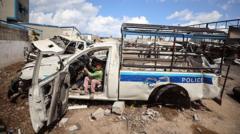The ongoing Israeli bombardment has resulted in the disintegration of Hamas's leadership structure and control over Gaza, with armed clans emerging as new power players in a region beset by chaos.**
Internal Strife: Hamas Loses Grip on Gaza Amidst Security Collapse**

Internal Strife: Hamas Loses Grip on Gaza Amidst Security Collapse**
A senior Hamas security officer reveals the armed group has lost 80% of control in Gaza, leading to a rise in local gang activity and factional conflicts.**
A senior officer within Hamas's security forces has disclosed to the BBC that the Palestinian militant group has lost approximately 80% of its control over the Gaza Strip, thrusting the region into a state of lawlessness as armed clans begin to fill the security void. The lieutenant colonel, who has been sidelined due to injuries sustained early in the conflict sparked by the Hamas-led attack on Israel on October 7, 2023, revealed that the group’s command system has collapsed under the pressure of relentless Israeli airstrikes, which have decimated its military, political, and security leadership.
In a series of voice messages shared anonymously, the officer painted a grim picture of Hamas’s internal strife and security crisis. "Realistically, there's almost nothing left of our security structure. The leadership is nearly extinct, with about 95% gone," he stated. "What's preventing Israel from pursuing its objectives further? The conditions are aligned for them to continue."
Strongly reflecting on the deteriorating situation, he indicated that the organization's previous attempts to reorganize during a ceasefire in 2023 were ineffective against the sustained Israeli offensive targeting its remaining structures since March. "The security situation has completely collapsed. There's no control anywhere," he lamented. “Looting has overtaken even the most fortified Hamas facilities, leaving no one to respond or intervene.”
The chaos created by this security vacuum has allowed various armed local clans to rise in power, terrorizing civilians with unchecked violence. "These gangs can kill or rob without fear of repercussion," he explained. The officer warned that any attempts at organizing resistance against such criminal activity were met with swift, deadly reprisals from Israeli forces.
Notably, on June 26, an Israeli drone strike reportedly killed 18 Palestinians in Deir al-Balah, targeting a Hamas police unit that was trying to exert control amid widespread chaos, further highlighting the dangers of the current environment.
As Hamas struggles to maintain any semblance of authority, six armed groups linked to local clans are positioning themselves within Gaza, significantly enhancing their influence and operational capabilities. One such faction is led by Yasser Abu Shabab, who poses a threat to Hamas’s dominance as both the Palestinian Authority and regional actors take notice of his potential as a unifying force against the group.
The Hamas officer acknowledged fear surrounding Abu Shabab’s rising status, emphasizing that the group is willing to act preemptively to eliminate him, fearing he could unite various factions competing against Hamas. "For years, Hamas has made enemies on every front," he warned. Should someone like Abu Shabab consolidate opposition forces, it could spell the end for Hamas's governance in Gaza.
As desperation deepens with rising gang violence and societal collapse, Hamas contends not only with the external Israeli military threat but must now navigate a precarious landscape of internal dissent and competition, a shift that could dramatically reshape Gaza's future.


















